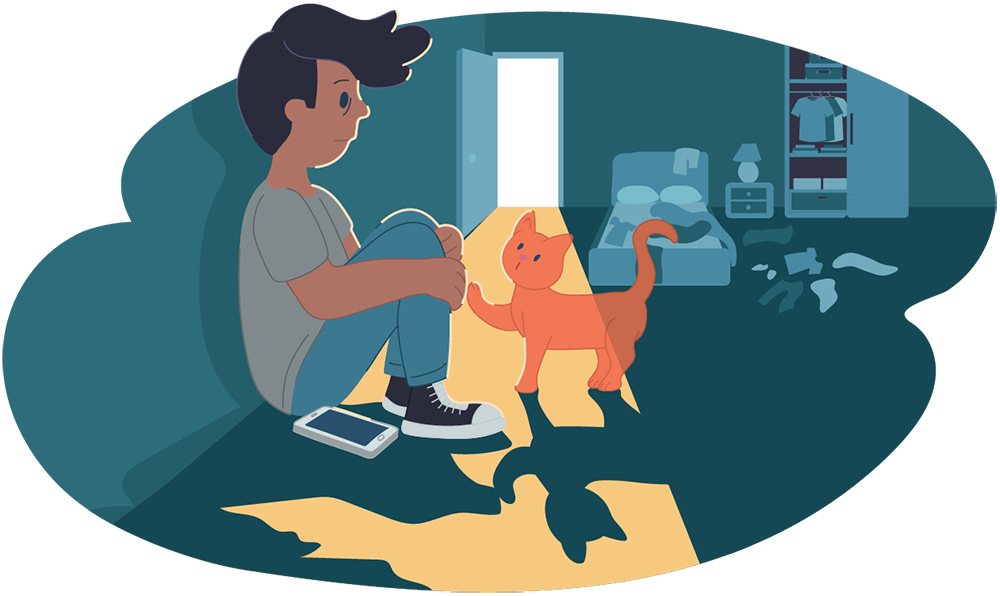My friend is thinking about suicide
When somebody wants to end their life it can be scary to ...
READ MESuicide shouldn't be a taboo topic. Let's talk about it honestly, openly, safely and with empathy. If you’re having thoughts of suicide, here are some things that can help understand them, stay safe and alive.
Content Warning: this article contains information about mental health which may be distressing or triggering.

If your life is in danger, please call 000.
Make your environment safe by removing things that may be used to cause harm. Get rid of, hide, or make it hard to access things you might use to end your life, e.g., wrap the item in layers of sticky tape, put it in the bin, flush it down the toilet, etc.
Get support. If your life is in danger, please call 000. If you need help staying safe, you can also contact us for support (on phone or webchat – calling on the phone is the faster way to get help) or connect with another service like headspace or the suicide callback service.
Delay. Don’t act on your thoughts of suicide right now. Postpone any decision to end your life for at least 24 hours. Setting timers or rescheduling the plan can be helpful. Give yourself a day to talk things through with someone you trust before acting on your thoughts.
Distract yourself. Your brain can't multitask very well and doing something that takes your mind off the suicidal thoughts and can help the urges pass, or give you a bit of a break from them. Try things you enjoy, like gaming, watching a movie, reading a book, etc.
Be around others. Contact a friend, go and spend time with family, etc. This can help you stay safe until the thoughts pass. (This is especially important at night).
Avoid drugs and alcohol. Alcohol in particular is a depressant – which means it can make you feel even worse.
Use a coping strategy. Coping strategies are very personal and it’s important to find things that work for you. Some people find it helpful to listen to music, or use art or creativity (like painting or song writing, etc.). You can also try mindfulness, meditation or talk to a counsellor about other strategies that might help (like grounding yourself, reframing thoughts, etc).
These thoughts aren’t true (even if they feel like they are) – they’re a side effect of feeling suicidal and our brain being really overwhelmed. Things can get better, and people can completely recover from suicidal thoughts and have a good life.
If you need help with suicidal thoughts, it can help to make a safety plan. A safety plan is a personalised list of guidelines you can follow to stay safe when things are getting tough.
A good safety plan includes things like:
You can create a safety plan on your own, with people you trust, with the help of a counsellor or by using this free app.
You might feel beyond your ability to cope with the physical, mental or emotional stress you are experiencing in your life.

Suicide can be seen as an option to stop hurting - people want to end the psychological or physical distress they're experiencing (i.e. they are trying to ‘protect’ themselves from further pain or to escape from their pain or situation).
Suicidal thoughts can also come up when someone feels like they are a “burden” or “worthless” or like they cause pain to their loved ones.
Suicidal thoughts can also occur in other types of mental health issues – such as Borderline Personality Disorder, Post Traumatic Stress Disorder, Bipolar Disorder and Psychosis.

It’s also important to know that depression and/or suicidal thoughts can sometimes be a symptom of a physical health issue. For instance, low iron levels or B12 levels, and hormone imbalances (like in premenstrual dysphoric disorder) may play a role in suicidal thoughts. Some types of substances or toxins can also cause suicidal thoughts, e.g. Irukanji jellyfish stings.
That’s why we always recommend seeing a GP if you start to experience suicidal thoughts – sometimes there are biological/health causes that are actually really straightforward to diagnose and treat.
Suicidal thoughts are very treatable – and understanding the cause is a really important step.
Here are some of the most common ones people talk to Kids Helpline about:
Unwanted or intrusive suicidal thoughts. These types of thoughts normally pop into your head pretty randomly and make you feel distressed. People with these types of thoughts are usually not planning to act on them and find them distressing.
Planning to end your life. If you have a plan (which might include how and when to end your life), it’s really important to reach out to Kids Helpline, or another professional service for support asap - especially if you're thinking of acting on your plan/harming yourself.
Wishing you were dead. When things are overwhelming, or it feels like stuff in life is beyond your ability to cope, you might find yourself wishing you were dead. These thoughts could also sound like, “Everyone would be better off if I wasn’t here anymore”, or, “I’m such a burden on everyone.” If you have these types of thoughts, it’s important to get support.
Thinking about how you might end your life. It can actually be quite normal to think about how you might end your life, in general. People with these types of thoughts usually don’t intend to act on their thoughts. However, if someone has a plan about what they might do and they are ‘ambivalent’ about whether they might do it or not, that’s a big warning sign. Ambivalence can look like: “Maybe I will end my life, maybe I won’t”; “I’m not sure if I'll kill myself or not”; “I guess we’ll see”.
Fantasising about unaliving myself. Some people might imagine or fantasize about being dead, including what their funeral might be like, how their family/friends might react, etc..
Hearing a voice in your head. Some people report hearing voices that tell them to kill themselves. Hearing voices like this can be very distressing and scary – and are a sign to get support.
Passive suicidality. People may be really struggling and not really be engaged or happy with life. They may not want to intentionally end their life but are no longer wanting to be alive and if something were to happen and they were to die, they wouldn’t be upset by this. This can look like people not taking steps to protect themself from harm or wanting something to happen to them where they end up dead.
It’s important to get professional support for any types of suicidal thoughts – especially if you think you might act on them, or they are causing you distress.
Myth:
Suicidal thoughts are rare.
Fact:
Between 22-38% of teens have had thoughts of suicide (which is pretty common!) If you’re having suicidal thoughts, you’re not alone.

Myth:
Only depressed people have thoughts of suicide.
Fact:
Some people with depression have suicidal thoughts – and some people with suicidal thoughts are depressed. But you can have suicidal thoughts without depression. In fact, you can have suicidal thoughts without any mental health issues at all.

Myth:
Thoughts of suicide never go away.
Fact:
Suicidal thoughts are temporary. For some people, suicidal thoughts come and go. For many people, complete recovery (not feeling suicidal anymore) is totally possible – especially with the right supports.
In 2023, Kids Helpline received nearly 12,000 contacts about suicide. Our counsellors are very comfortable supporting people who feel suicidal.
There is no right or wrong way to share suicidal thoughts. The counsellors will work with you as team to understand these thoughts and urges, what they mean for you, where they come from, and how to stay safe. This is based on your strengths, interests, supports, and what feels achievable.
In most cases, we don’t have to share with your parents (or anyone else) that you’re having thoughts of suicide. In 2023, 85.5% of suicide contacts to Kids Helpline reamined confidential within Kids Helpline.
The only time we might need to tell somebody is if you or someone else are in a life-threatening situation or are in danger of being significantly harmed (such as someone who has attempted suicide and needs an ambulance).
In times like this we have a responsibility to protect you (or someone else) from harm. We will talk with you about this beforehand wherever possible. If you have any questions or concerns, please speak with your counsellor.
Different services have different rules about confidentiality. The counsellors at Kids Helpline will remind you of these rules at the start of each conversation. An easy way to find out what the rules are is to ask. You have a right to find out that information, and it's ok to ask questions about it.
My friend is thinking about suicide
When somebody wants to end their life it can be scary to ...
READ MESelf-harm
Sometimes people self-harm as a way to cope. Learn what self-harm is, ...
READ MEAll about depression
Depression is more than just feeling sad. It's a mixture of thoughts, ...
READ MEDepressive disorders
Most people have experienced feeling depressed, but not everybody has a depressive ...
READ ME
Talking helps! We’re here for you.
No problem is too big or too small.
We're here 24 hours a day, 7 days a week